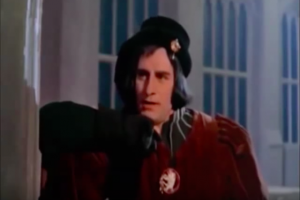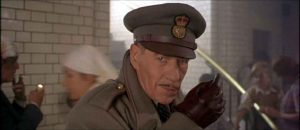I chose to compare Laurence Olivier’s and Ian McKellen’s versions of Richard III’s soliloquy in act 1 scene 2 that we saw in class. We analyzed these scenes in our first class and I feel like more can be said. Our general consensus was that we preferred McKellen’s version, because it was more modern and less stuffy. McKellen’s version was humorous while Olivier’s version was dignified. But that’s as far as we got.
In Olivier’s portrayal of Richard III, he chose to stay very traditional. The set design and costumes were accurate to the original setting and time period. Olivier delivered his soliloquy in the style of Shakespeare, overly dramatic and poetically enunciated. His tone was nasal and he delivered his lines pompously. He is alone in a courtyard delivering his lines without any musical background or other visual or audible distractions. The focus is entirely on him. This gives the illusion that we are accessing his personal thoughts. This is a private moment and we are not intruding per say, but we are witnessing something that he would not have shared with another character in the play.

Both speeches were much shorter than the original soliloquy. Olivier cut out two-thirds of the text and McKellen cut out half. This is often necessary for screen adaptations, but because they cut out so much, they lose some of the meaning. Olivier omits the part that recounts the acts of evil he committed, namely killing Anne’s sweet husband and father, and that despite this and his physical deformities, Anne overlooked his faults and basically agreed to be with him. McKellen omits the part that depicts how sweet Anne’s deceased husband was but left in the recap of Richard’s evil deeds.
Of the text that Olivier chose to include, he made one notable change. “My dukedom to a beggarly denier” [1.2.253] became “my dukedom to a widow’s chastity.” Overall, the general meaning remains the same. Richard believed for so long that he was ugly in the eyes of others, especially women, because of his deformity. But the woman of his affections seemed to overlook his deformity, and all his other faults. He is as incredulous that this woman thinks he is good-looking as if his dukedom had been transformed into something lesser. The word choice for the lesser part of the comparison changes the meaning of the phrase significantly.
A denier is a coin of low value (one-twelfth of a sou), beggarly means poverty stricken or deplorable. In Shakespeare’s original text, Richard’s dukedom, which represents his wealth, status and power, was compared to one lowly, basically worthless coin. This means that Richard was as shocked that a woman could think him handsome as if all his wealth, power and status was worthless.
A widow is a woman whose husband has died. Chastity is sexual abstinence. A widow, who had previously had sex with her husband, was expected to remain abstinent after her husband’s death for the remainder of her life. This rarely happened. So not only is a widow no longer a virgin, but she is unlikely to remain abstinent after her husband’s death. In Olivier’s adaptation, Richard’s dukedom was compared to the oxymoron “widow’s chastity.” This means that Richard thought someone liking him was as unlikely as if his wealth, status and power was a fallacy.
Set in 1930’s Nazi Germany, McKellen played Richard III as a Nazi officer. Upbeat jazzy music played in the background and McKellen walked through crowded hospital hallways interacting with other characters, who were unaware of him talking or breaking the fourth wall. This is in stark contrast to Olivier’s more traditional, silent, solitary ponderings. McKellen looks directly into the camera as it follows him down the hall and questions the audience directly, as if asking them to join in his exuberance at successfully wooing Anne. He is manically happy to the point of being frightening, whereas Olivier was calmer and more pensive, while still being contented.

Both Olivier and McKellen delivered the line “shine out” [1.2.264] abruptly and loudly. McKellen continues in an upbeat way, almost laughing. You can hear the giddy pride in his voice. The jazzy music climaxes as he climbs stairs and exits. McKellen starts by pointing to the sun, and then turns back to the camera to brag to the audience about how good he looks. Olivier delivers all his lines to the sun. He looks skyward and continues calmly, quietly smug. Olivier’s speech ends with ominous music and his shadow falling on Anne’s skirts.
Olivier and McKellen both portrayed Richard III, but did so very differently because of divergent stylistic choices.
References:
Richard III, William Shakespeare (1592)
https://www.playshakespeare.com/richard-iii/scenes/898-act-i-scene-2
Films:
McKellen – Richard III, Richard Loncraine (1995)
https://www.youtube.com/watch?v=3wxGfjcfZkA
Olivier – Richard III, Laurence Olivier (1995)
Leave a Reply
You must be logged in to post a comment.